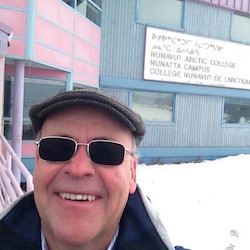News
» Go to news mainFaculty of Management's adventures in Nunavut
 тАЬIt was like being in a desert, but with snow instead of sand,тАЭ recalls Rowe School of Business professor Dr. Jim Barker. тАЬAnd like a desert, the more you look, the more beauty you see and the more fascinated you become. The buildings are all on pylons. The people have adapted. Water has to be brought in. There are amazing different forms of adaptation.тАЭ
тАЬIt was like being in a desert, but with snow instead of sand,тАЭ recalls Rowe School of Business professor Dr. Jim Barker. тАЬAnd like a desert, the more you look, the more beauty you see and the more fascinated you become. The buildings are all on pylons. The people have adapted. Water has to be brought in. There are amazing different forms of adaptation.тАЭ
Barker is speaking of Iqaluit, where he spent a few days in May to begin a project entitled тАЬProgram to Develop Government of Nunavut Leaders.тАЭ The project grew out of a request by NunavutтАЩs government for proposals on how to better equip their civil servants and leaders. тАЬWe were approached by the partners who put this proposal together, PGF Consultants and the Institute on Governance [IOG],тАЭ explains Martine Durier-Copp, Director of the Centre for Advanced Management Education and one of the project leads for Dalhousie. PGF and IOG, which work in leadership development, wanted an institutional partner to ensure the programтАЩs educational quality, and because тАЬthey want to translate leadership development to graduate and undergraduate programs,тАЭ says Durier-Copp. PGF, IOG and the other partners submitted their proposal to the Government of Nunavut in November 2014, and learned a few months later that they had won the contract.
┬атАЬItтАЩs a great point of prestige for us to be chosen,тАЭ says Barker. тАЬDalhousieтАЩs primary role is to grant advanced standing towards some of our programs. We review the training programs to ensure that they are of a high academic standard, and offer a pathway into our Bachelor of Management and Master of Public Administration (Management) programs for students who have completed them.тАЭ ║┌┴╧│╘╣╧═Їwill be working with the project leaders as well as three other partners: First PeopleтАЩs Group, which will focus on incorporating Inuit culture into the program, Lead Action, which will provide much of the actual training, and the Government of NunavutтАЩs Arctic College, which will also deliver training. The educational programs will be offered to three groups of varying seniority in the government; instructors will deliver management courses in short modules. Barker, with Management colleagues Dr. Robert Moody and Dr. Dan Tucker, will contribute to curricula and course development.
┬атАЬFrom the Government of NunavutтАЩs perspective, that means there is a very high standard of education,тАЭ explains Barker. From the Faculty of ManagementтАЩs perspective, this is an opportunity to expand the Bachelor of Management programтАЩs online delivery. At present, the MPA(M) is already available online, so graduates of the Nunavut program will be able to complete it long-distance. тАЬItтАЩs a matter of articulating pathways in a way that works for the Government of Nunavut and the participants,тАЭ says Barker. тАЬThis program also creates the opportunity for the Faculty of Management to build on existing collaborative agreements between ║┌┴╧│╘╣╧═Їand Arctic College.тАЭ
NunavutтАЩs government, he notes, has been extremely thoughtful about the program: тАЬJust to get to the stage of accepting proposals was four years of work. TheyтАЩve researched and looked at what they need and want to accomplish.тАЭ Geography makes Nunavut a unique territory for government and civil service, and visiting Iqaluit was eye-opening for Barker. тАЬI didnтАЩt have an appreciation of Arctic Canada and its issues and its opportunities,тАЭ he says. тАЬIt was a great way for me to be educated about those.тАЭ Nunavut, he says, is dedicated to improving prosperity and health while maintaining a strong focus on Inuit culture. тАЬIt canтАЩt just grow,тАЭ says Barker. тАЬIt has to be sustainable. Just like the water. Developing leadership in its employees is an essential way of doing that, and thatтАЩs what ║┌┴╧│╘╣╧═Їis participating in.тАЭ Through this project, the Faculty of Management is fulfilling part of its mandate for impact: тАЬAn essential part of the Faculty and of the Rowe School is our ability to transform, because of the impact we can have,тАЭ says Barker. тАЬWe have never been involved with a government on this level, but weтАЩve been selected to do so because of the quality of our programs and our reputation.тАЭ Durier-Copp, who is hoping to eventually include all four schools in the Faculty of Management, is enthusiastic about the project. тАЬThis is an incredible opportunity to help build the territory of Nunavut,тАЭ she says, тАЬand to be a partner with them in a development project here in Canada.тАЭ
Recent News
- Celebrating 20,000 Business Work Terms: Jamie McGuiganтАЩs Journey from ║┌┴╧│╘╣╧═ЇStudent to Scotiabank Leadership
- Q and A with Alison Brown: The twists and turns which led her to Information Science
- The Bachelor of Management is 25!
- From MBA classroom to the frontline of healthcare
- Yirun Wang (BMgmtтАЩ24) builds a community while earning his degree
- Alum finds ways to have a big impact on health and students
- Building a path forward with work integrated learning
- Two exciting milestones, one amazing Dal Business Networking Night
